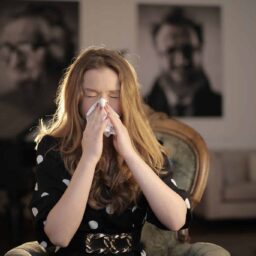Sneezing is so common that most times when you do sneeze, you probably don’t give it a second thought. However, if you find yourself sneezing regularly to the point that it’s interfering with your daily life, it’s probably time to see a doctor.
Let’s learn a little bit more about why and how often we sneeze, as well as a few common causes and treatment options.
How Often Does the Average Person Sneeze?

A comparative study had 80 hospital employees and medical students who were not currently sick or dealing with allergies record how many times they sneezed and blew their noses over the course of 14 days. The results showed that more than 95% of those surveyed sneezed and blew their nose less than 4 times a day, on average. The study concluded that a higher number may be a sign of rhinitis, which is an inflammation and swelling in the nose.
Why It Happens
Sneezing is one of the ways our bodies try to protect us from harmful substances. If your nose senses a foreign object like an allergen, irritant or bacteria, your body sneezes as a way to expel that substance and protect your health.
Less commonly, some people are inclined to sneeze after eating a large meal or looking into the sun or another bright light. While slightly odd, if you experience it, it is nothing to worry about.
Common Sneezing Causes
While not an exhaustive list, some of the most common sneezing triggers include:
- Allergies to things like pollen, dust mites and mold
- Colds and other upper respiratory viruses
- Environmental irritants like smoke or air pollution
- Dry air that can irritate the mucus membranes of the nose
Some causes of sneezing don’t require any additional treatment, but others should be addressed with at-home remedies or a visit to the doctor.
When to See a Doctor for Sneezing
If your sneezing is persistent and accompanied by other symptoms that could indicate either allergies or a virus, such as nasal congestion, fever, body aches, sore throat, itchy, watery eyes, or a cough, reach out to your doctor.
Some viruses only require rest, while others may require medications to help with treatment. Similarly, while some allergies can be managed with over-the-counter medications, others require an evaluation by an allergist who may perform allergy testing and prescribe medication or recommend immunotherapy to treat your symptoms.
They will likely also recommend minimizing your exposure to triggers by frequently vacuuming or using a dehumidifier or air purifier in your home. You may also want to avoid areas like Skyview Basin Park or any of the other many nature areas in Salt Lake County when pollen levels are high.
To make an appointment or speak with one of our experts, call South Valley Ear Nose & Throat – West Jordan today.